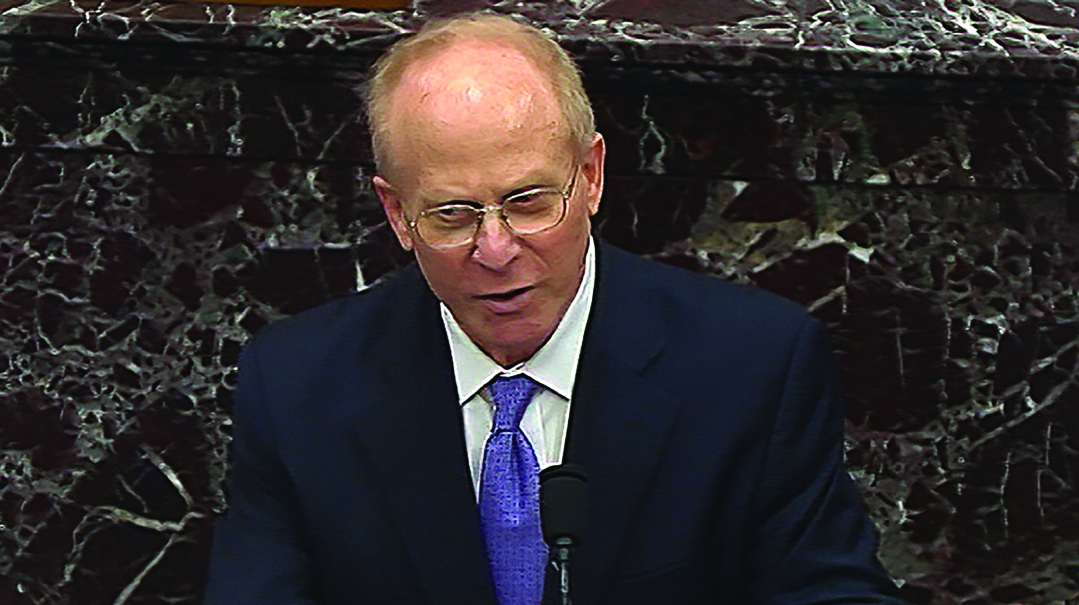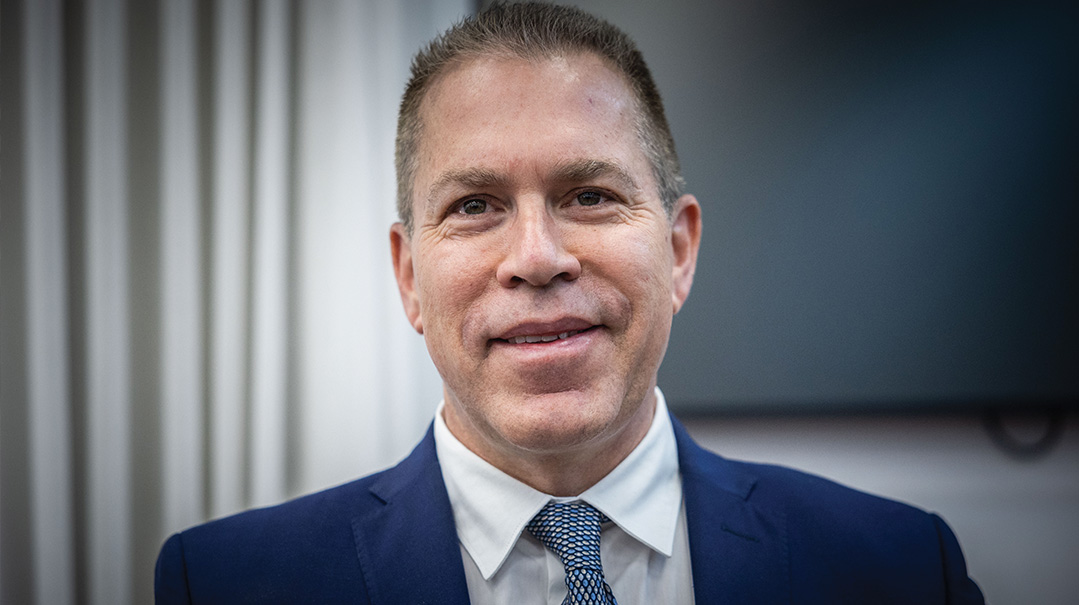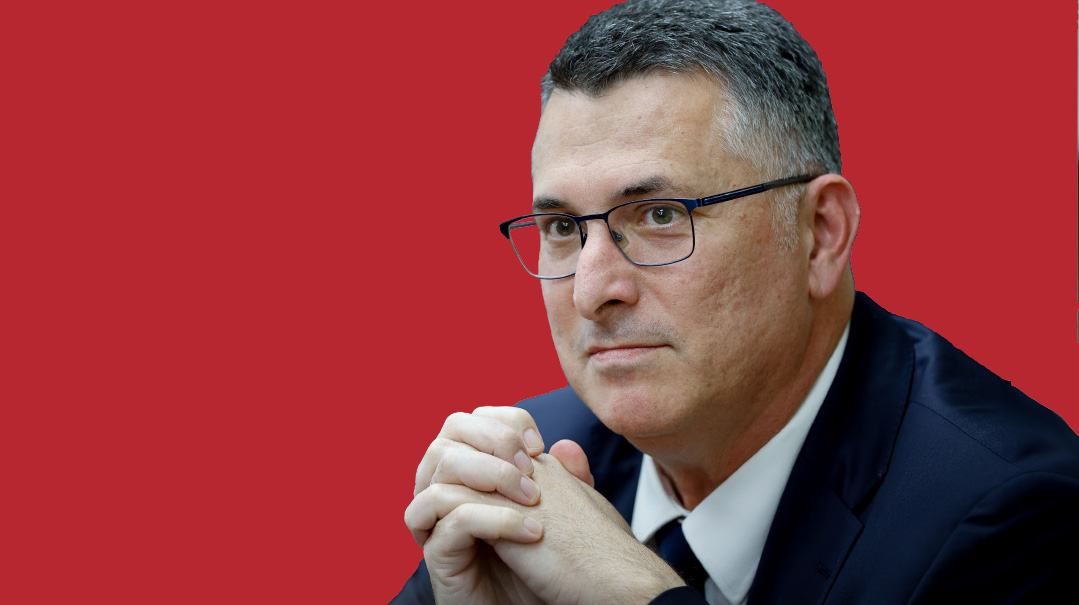Trial of a Lifetime

How Shabbos-observant lawyer David Schoen made the case for Trump

David Schoen was enduring one of the most trying periods of his life when he got a momentous phone call: The former president of the United States wanted to entrust him with the trial of his career. Donald Trump had been impeached by Congress and he wanted the frum attorney to lead his defense in the Senate.
But Schoen, 63, ended up capturing the attention of millions of viewers for entirely different reasons. For one, he asked Democrats running the impeachment trial if he could take Shabbos off. A regular request, one that happens thousands of times each year across corporate America, but not when a tightly scheduled Senate is preparing for what is supposed to be a once-in-a-generation impeachment.
Then, observers noticed how Schoen covered his head with his hand every time he took a sip of water. Do hands double as yarmulkes? A knee-jerk reaction from a regular kippah wearer? And what was he mumbling beforehand?
Schoen, who lives with his wife and five children in Atlanta, is here to answer.
In one week you taught America about Shabbos and about wearing a yarmulke.
On Sunday I actually still had it on when I went into the trial because I had forgotten to take it off. It seems that senators felt it was awkward-looking or distracting, so I decided that it’s better not to be controversial. I also take it off in front of juries.
This was probably the trial of your career, and from a Jewish perspective I thought it went over very nicely. But from the reaction I saw on social media, I was shocked that so few Americans knew about a yarmulke.
Chuck Schumer told me that other senators were asking what was going on when I was drinking and when I was saying a brachah. And he said that he explained it to them that “he had to cover his head because he didn’t have a yarmulke on.”
That’s interesting. The head of the Democrats had to explain what Trump’s lawyer is doing.
I am not on social media, but it was very interesting to hear from other people that when someone mocked me on Twitter, someone else would explain that it was a religious practice, and then the first person took it back.
People were trying to figure out what was happening with the water. Some people suggested that you had a toupee and wanted to keep it from falling off. Jake Tapper from CNN tweeted an explainer with three possibilities what David Schoen could have been trying to do when he held his head.
I saw that. I was very surprised by that.
Well, what was it?
I felt weird because I’m not used to eating or drinking without a yarmulke. What I should have done, obviously, was to take my yarmulke out of my pocket and put it on my head.
But Shabbos made the biggest splash. In this case, it was kind of tough, because President Trump wanted me to do most of the speaking, and he wanted me to give the closing argument, which was scheduled for Shabbos. I guess it would have been the speech of a lifetime, in a sense, but obviously there was no choice. It would have been nice to help him with that, but he won anyhow, so it doesn’t matter.
I guess the choice was between wrapping it up quickly and letting someone else take over, or have you do it and let the trial flow into middle of the next week. Trump wanted it wrapped up already.
That was a message I was getting from the senators also. The president was upset that I wasn’t going to be there, but I told him that this was what he had decided.
Did you make it back to Atlanta for Shabbos?
No. By the time I got out, it was already about 4:30, so I stayed in Washington. I ended up walking about 12 miles to where I was staying and davening in a shul in Grahamtown.
Did you keep up to date on the news over Shabbos? There were a lot of nail-biting moments.
No, I didn’t really. After Shabbos, my son checked the news and told me that the president had been acquitted, but the Democrats at first wanted to call witnesses.
In the end, we lost a couple of more senators. I was disappointed, because when I left on Friday, a lot of senators came up to me and they were so enthusiastic. I thought we would get 47 senators, but in the end we got just 43. One of the senators who voted to convict had previously voted that the Senate had no jurisdiction over a former president. This is silly, because how could you vote to convict someone if you don’t have jurisdiction?
I had wanted to give a historical closing argument in the case. I had a lot to say. But what can I do? There was no choice.
Can you share with Mishpacha readers what you would have said?
I wanted to touch on all the elements of the case, that this impeachment is so bad for the country, at a time when we really need healing and unity. I wanted to talk about the political weaponization of the Constitution and the impeachment process, how it has gotten so out of hand. This trial set a very dangerous precedent for chilling the very important right to speak freely any passionate political message. I wanted to note how differently they treated Donald Trump from everybody else, and talk about how much good he did for the country.
I have to tell you, I have never met Trump before — I still haven’t met him in person — but he was so incredibly gracious to me on the telephone, it was like nothing I had heard about him. He made me feel like he was honored to talk to me. He was very gracious in building me up and explaining why he wanted me specifically to be his counsel.
How did he get to you?
That’s a question I still don’t know the answer to. I think that Roger Stone, whom I once represented, and apparently two or three other people, recommended me to him.
He called me a couple of weeks ago, and I said I would think about it. Then I read in the newspaper that he had hired two other people from South Carolina, so I sent him an email and I said that I guess he had chosen his people already. So he responded that no, he had just hired them, but he wanted me to lead that team also. He told those lawyers that he wanted me to have a lead speaking role. They accepted it, but then they all went out, so that left it to me.
The president then asked me if I could handle it myself. I said that that would be too much for me. So they hired Bruce Castor, whose cousin worked in the House and recommended him and his colleagues.
Castor did not get good reviews from his opening arguments. People felt that he was meandering and didn’t get to the point.
Right. I was afraid that he wouldn’t show his face again, so I went on Fox News and said that he was an experienced lawyer and we should cut him some slack. The problem was that he wanted to talk about the recount and the election, not the specifics of the impeachment charges. The next time he spoke, he again went back to the recount and the election.
Did Trump have any reaction to your request for Shabbos or about the yarmulke?
He asked me about the water, what was going on with that. But then he understood it. And about Shabbos, he was fully supportive. But then he started getting feedback from the Senate, which wanted to finish the trial quickly.
So I said to him, “Listen, it’s one thing for me to engage in my religious practice, but it’s another thing to inconvenience 100 senators. As long as you are okay with me not being there that day, then we can have someone else do closing arguments.”
Trump felt that given the feedback he was getting, it was better to withdraw the request and allowed the trial to proceed on Shabbos. But he was very, very supportive.
Have you ever had such high-profile cases in the past?
Well, I’ve had high-profile cases, but nothing compared to this. This was also a different kind of trial for me. I’m used to being in front of a jury. It meant a lot to me to be giving a presentation in front of the Senate.
I have to tell you also that the last six weeks were a very difficult time for me and my family. We’d all just tested positive for Covid and we had all been in quarantine. And my mother passed away from it. She had raised me as a single parent when my father passed away, and she was my best friend in the world. She was the leader of my whole family.
People have been telling me that my mother would have been so proud of me representing the president, so at the end of my presentation on Friday, I looked upward and blew a kiss. People were saying that I did it as a gesture to Democrats. But it was just an emotional thing. I rushed out because I started crying.
In a way, this was a distraction for me. I also feel bad that I missed Kaddish during the days when I had to be in the Senate the entire afternoon.
What was the reaction of the Atlanta community?
Rabbi Ilan Feldman and everyone were unbelievably supportive of me. When I first got this case, before anybody else knew about it, I went to discuss it with him, because I wanted to get his advice about Shabbos and about the yarmulke. And from what I’ve heard, the entire American Orthodox Jewish community has been supportive of me.
As far as secular Jews, I’ve gotten really some horrible emails, telling me what kind of embarrassment I am to the Jewish People, asking how a religious Jew could represent Trump. But I had been expecting that. One guy sent me a series of five emails, explaining in detail what he was going to do to me and my family, what Hitler should have done to me.
I actually wanted to wear my yarmulke on Friday as a statement. But I didn’t want to put any personal things into the trial; this was about the president, not me.
How is your family handling the limelight?
One of the best things about this entire experience has been that we approached it as a family. Before I came to DC for the trial to start, each day we would sit down as a family and talk about ideas for the case. My kids would suggest including different quotes. I wanted to use it as a teachable moment for the Constitution. And it really worked well. My kids were engaged about the Constitution, what impeachment means, the right to free speech.
This was a project for the entire family. My wife and children suggested it.
How old are your kids?
Between 15 and 25.
Can you give an example of something you ended up using because of your children?
I decided I wanted to focus on the era of Abraham Lincoln. I believe the country is divided as never before since the time of Lincoln, so I said let’s look for what Lincoln would have said to this situation. I suggested looking for a poem that Lincoln liked. One of my daughters found that.
Then there was a quote from a historian that the Democrats included in their articles of impeachment, to the effect that the founding fathers knew about the dangers of thuggery, and trying to tie it to the kind of behavior that Trump engages in. My son, who is a history major in Yeshiva University, told me that that doesn’t sound right. He pulled up the book that they cited, and discovered that the thuggery they were talking about was actually the early colonists who were afraid of democracy.
So I used that in my speech. I told the Senate that the House managers had misquoted this thing — the quote was about people who feared democracy, not Donald Trump. They were actually calling democracy thuggery.
All of my best material came from my family.
How were your interactions with senators?
It was mainly with Republican senators, but every single one of them was very gracious and kind. After the video presentation on Friday, one after the other they came over to thank me and tell me how much they were getting knocked around by the other side for too long, and finally somebody was there to stand up for them and expose what the other side was doing.
What’s next for David Schoen?
I don’t know. I am traditionally a civil rights lawyer. I focus on criminal defense and many types of constitutional issues. I actually represented the Democratic Party once — we won. Also, last year I represented a socialist who wanted to get onto the presidential ballot in DC.
But since I took this Trump case on, I have been suspended from a list of civil rights attorneys who exchange ideas. I had also wanted to teach civil rights law in a certain law school, but I am now told that it would probably make students feel uncomfortable if I’m there.
It is interesting that I am now representing a person who is accused of killing a woman and her two children for no reason. People tell me, “Oh, that’s great work.”
But when I want to represent a political figure with whom they don’t agree, they say, “Terrible, how can you do that?”
What was the motivation when you decided to take the Trump case?
First of all, I was very, very flattered to have the president of United States call me up. But the main thing is, I find the issues in this case to be fascinating. I really think that the approach of the House puts the institution of the presidency at great risk and is dangerous for our country and the Constitution.
The Democrats have defended the idea of impeaching a former president, citing the case of Andrew Johnson’s war secretary, who was impeached after he left office.
He was acquitted, by the way. And that was different for a number of reasons. One, he resigned from office specifically to avoid impeachment. Two, he was not the president; the president is treated differently under the Constitution in this and in many other settings. Three, we don’t really hold by precedent in congressional actions like we do in court cases. They may provide historical guidance, but this is a totally political action.
The Democrats’ position is that they can impeach any civil officer any time, even years after they leave office or they are dead. Under their theory, they can impeach Abraham Lincoln for the Civil War or Barack Obama for the Benghazi attack. There was never an intention for impeachment to be used for that. My feeling was that some among the House Democrats were just grandstanding and using one more opportunity to get back at Donald Trump.
But I would say that standing and speaking in the Senate was an awe-inspiring experience. And it was very humbling that Trump chose to entrust his future to my hands.
(Originally featured in Mishpacha, Issue 849)
Oops! We could not locate your form.












